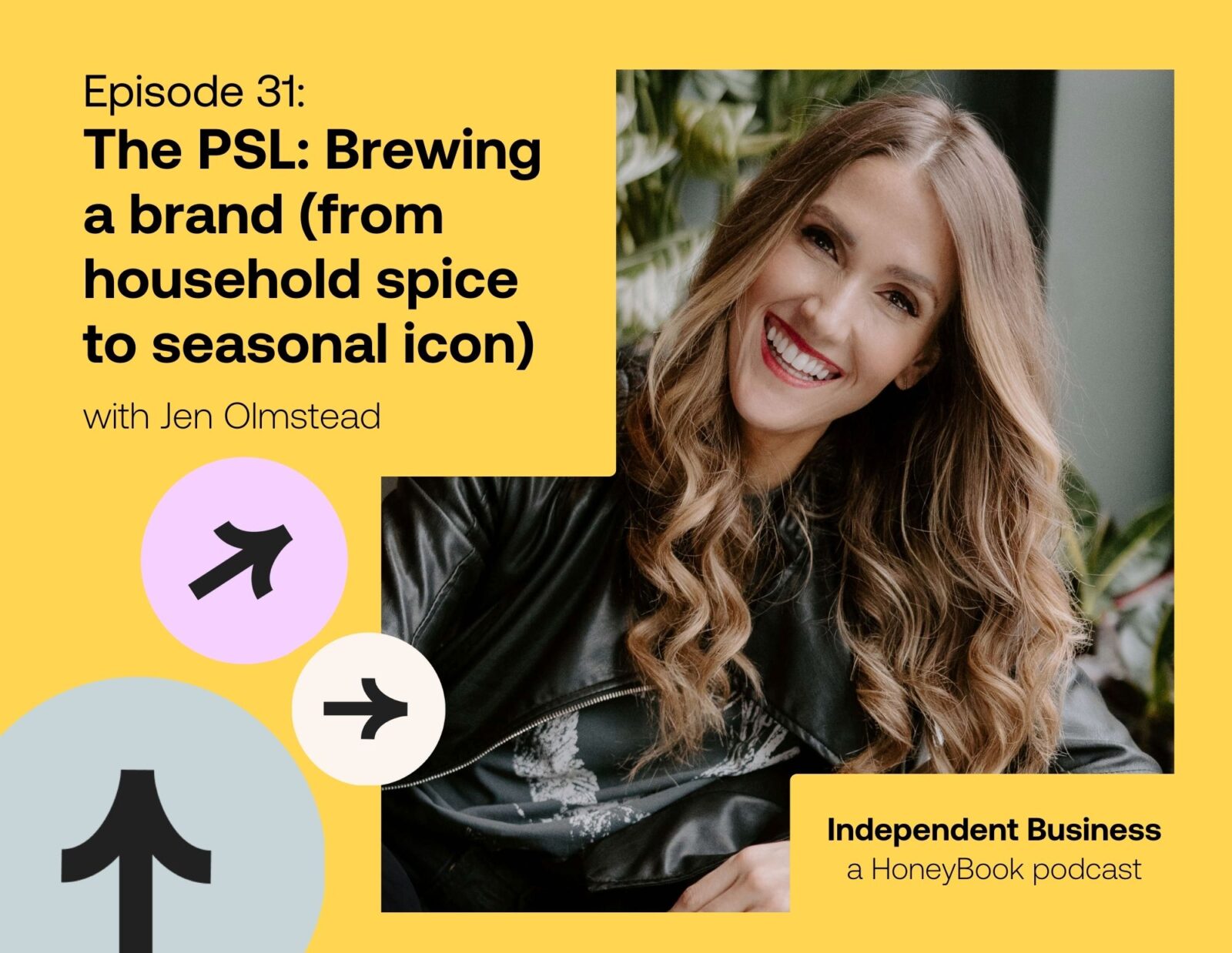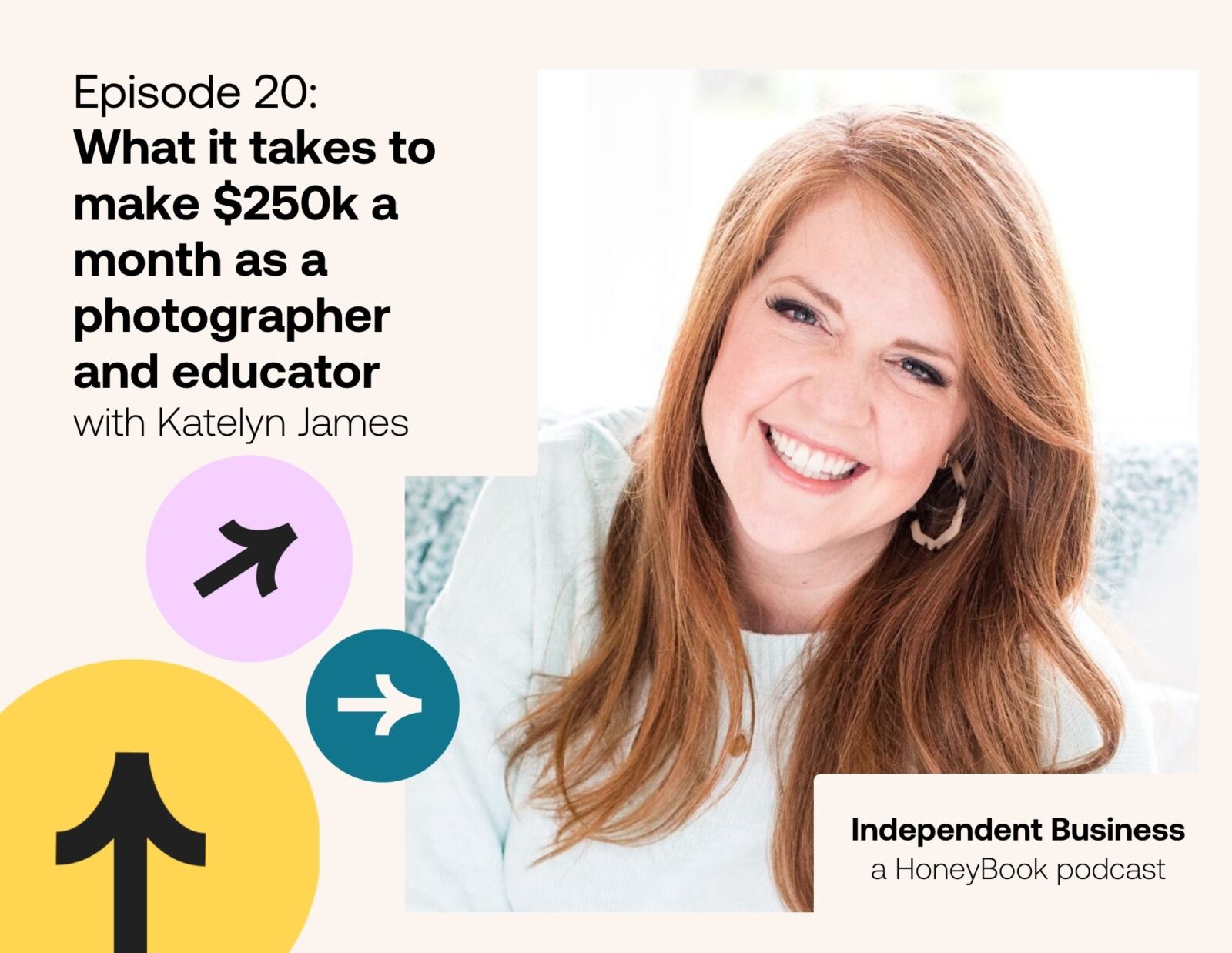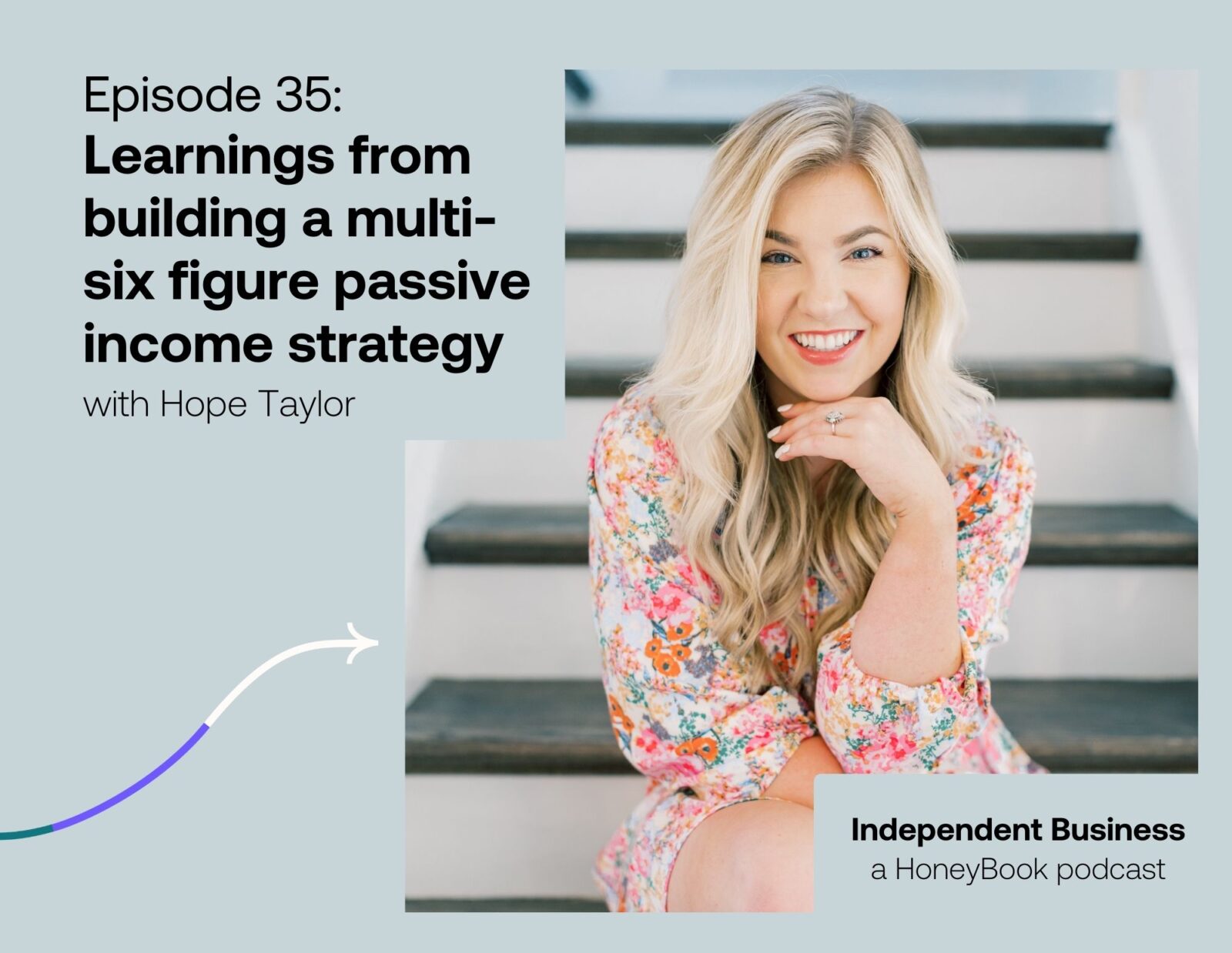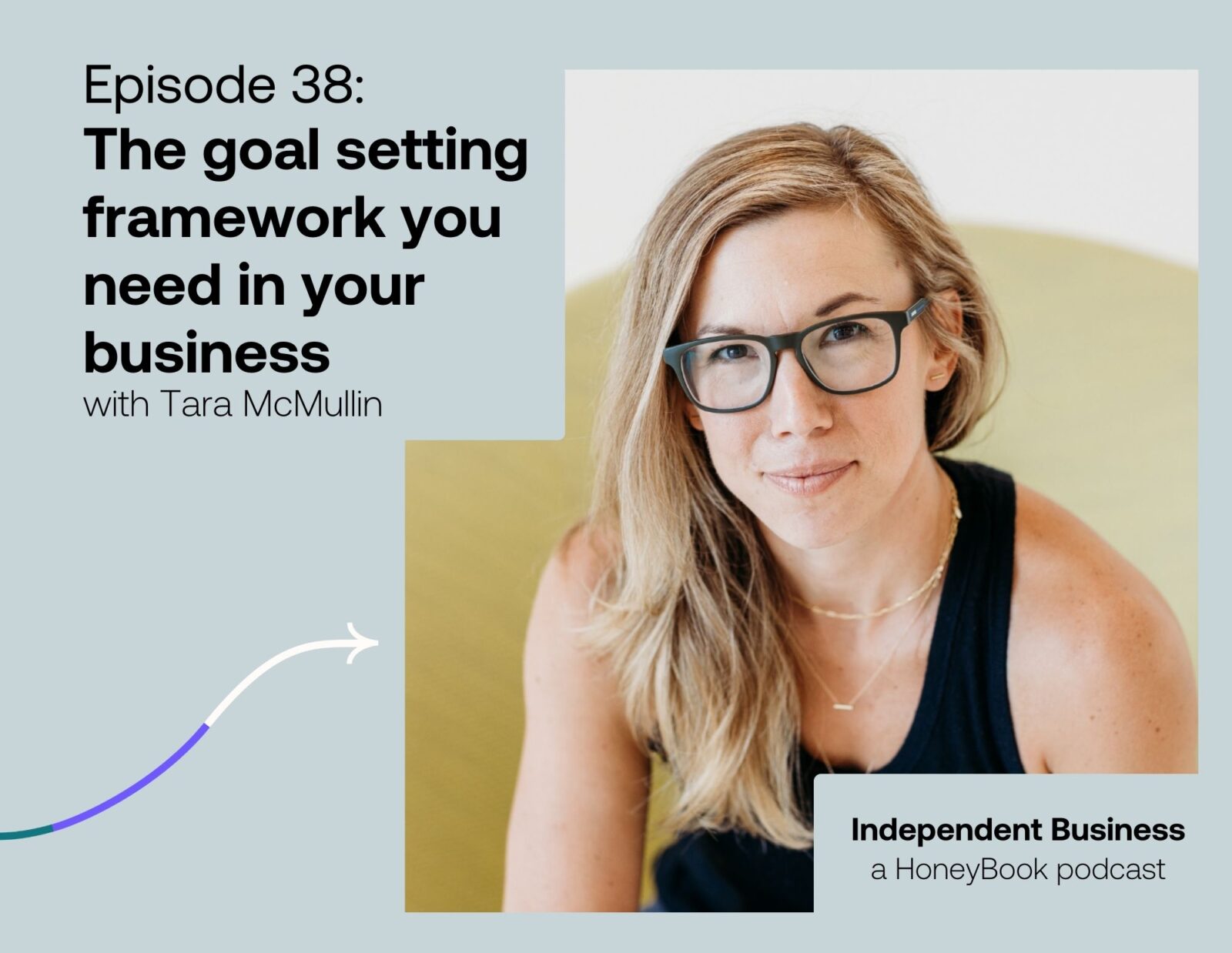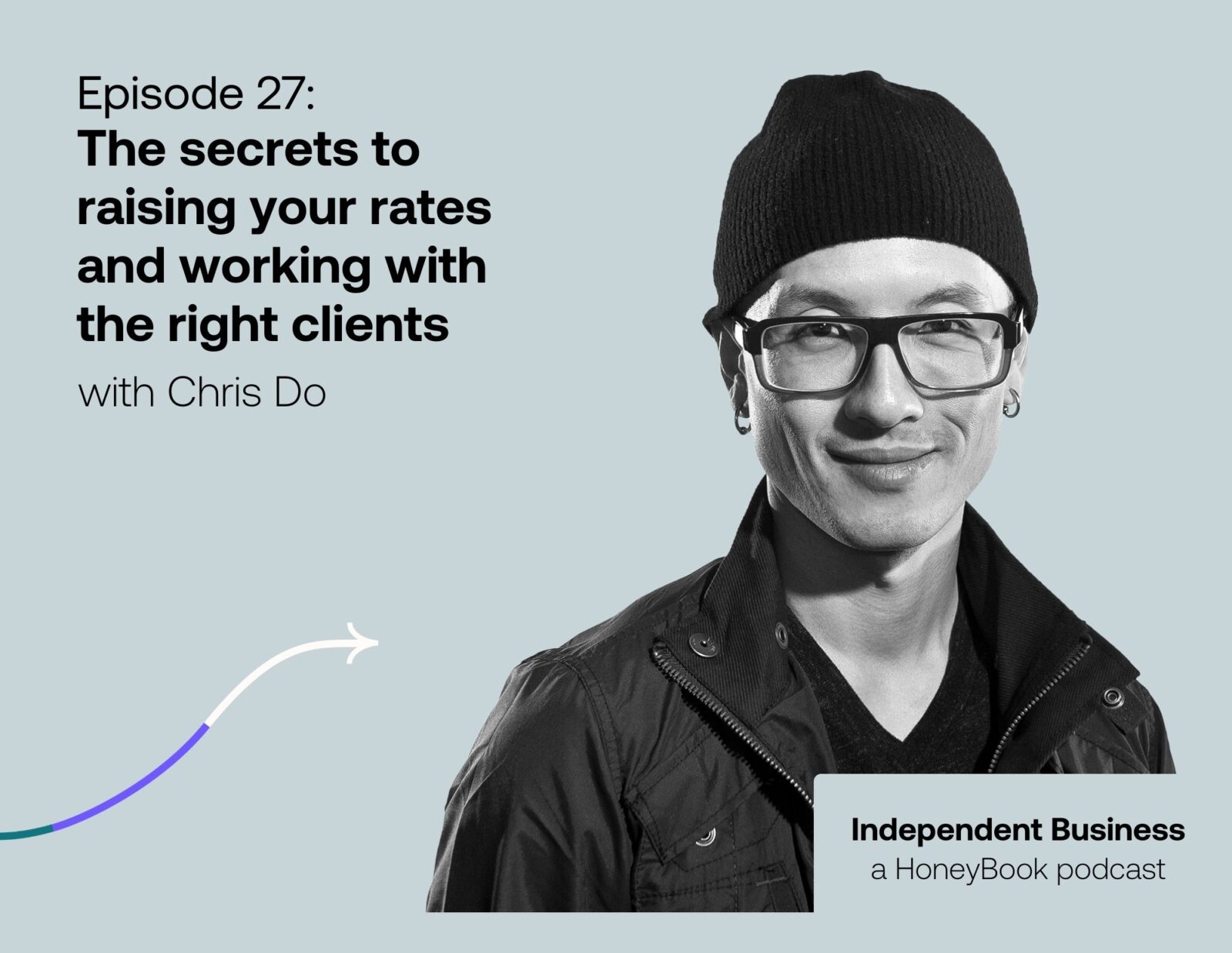I'm a Storytelling Strategist who empowers creative entrepreneurs to create captivating stories that drive real results.
Meet akua
business
storytelling
marketing
personal
here's the tea with akua
browse by category
listen here
While we near the end of what’s possibly the longest month ever, I wanted to share some of the top business lessons I’ve heard as the host of Honeybook’s Independent Business Podcast to help us all keep up that new year energy (and hit some of the goals we have set four ourselves this year!). Interviewing such incredible entrepreneurs has definitely been a highlight of my career, and I can’t wait to share just a few of them (15!) with you today!
Business Lessons from Jen Olmstead
In “The PSL: Brewing a brand (from household spice to seasonal icon)“, Jen blew my mind more than once with her pumpkin spiciness. If you haven’t fallen in love with Tonic yet, this is a good place to start.
1. You Don’t Have to Be Creating Something New Constantly
We all know that the PSL has become a seasonal phenomenon, yet the recipe has remained largely unchanged over the years. What Starbucks is really great at isn’t making the perfect latte; it’s reinventing the marketing around it every year, keeping the product fresh in our minds without altering its core. Jen talks about how Starbucks has been selling the PSL every single fall for twenty years, and we, as small businesses, sometimes worry about repeating things two years in a row. We shouldn’t worry!
2. Don’t Forget to Sell the Feeling, Ideas, and Community
Jen pointed out that Starbucks’ marketing for the PSL doesn’t really talk about the drink’s taste. Like – 0% of the marketing revolves around the taste. Instead, the emphasis is on the feeling it evokes – a sense of coziness and warmth associated with the fall season. They’re selling the feeling and the idea of fall. Twenty years later, they also sell the idea of the community you become a part of as soon as you order your first PSL of the season.
3. Seasonality is Just Scarcity and Urgency (Two of the Most Powerful Marketing Strategies!)
Jen dropped SO much gold during her PSL case study interview, but I especially loved it when I asked her how we can incorporate the seasonality of the PSL into our own businesses. Jen shared how seasonality, in essence, is just about creating scarcity and urgency. We ALL know These age-old marketing strategies, but Starbucks has truly mastered them because, let’s be honest, the PSL’s success is largely due to its limited availability. If Starbucks offered it all year round, it would lose its appeal.
Business Lessons from Katelyn James
This interview with Katelyn James happened before I took over as the host for Honeybook’s Independent Business Podcast, but there were so many gems I knew I had to include it. It was tough to narrow down the business lessons to just three!
1. There’s Always More Behind-the-Scenes Than You Think
Katelyn James’ interview happened right after a CNBC news article came out with the headline, “A college side hustle made her a self-made millionaire before she turned 30—here’s how she got started“. She shared how while her revenue is over $250,000/month (WOW!), that’s not the whole story. She talked about how the headline was crafted to generate clicks and focus on the money, but the truth is that she had been in business for 14 years before this CNBC moment.
In her own words, she talked about how you don’t see “the tears, the heartache, the bad decisions, the unhealthy seasons in our marriage, when my workaholism just took over, none of that played out into that story. So you’re seeing literally the most shiny, impressive part of me, almost minimizing what it took to create it.” I LOVED how candid she was!
2. Burnout Can Come From Believing a Lot of Things That Weren’t True
One of the biggest mic drop moments from Katelyn’s interview was when she shared that burnout can come from believing things that aren’t even true. One example she gave was feeling like, “It’s all on me,” because she’s the name (and face!) behind Katelyn James! Her business coach reminded her that if something broke down on her course platform, for example, she wouldn’t be the one to fix it. I thought that was such a powerful story about how we can all fall into when believing things that aren’t true (GUILTY!).
3. Change is Inevitable
Who else goes straight to fear when something new pops up on the scene (looking at you – Instagram reels!)? Katelyn shared that when AI made a scene, she was immediately worried it would ruin the whole industry. After more thought, though, she shared how she started thinking about how to use the change for good. AI is going to make people come running towards what’s real. Authenticity is always something her audience has loved about her and it’s something she’s going to lean into even more now!
Business Lessons from Hope Taylor
Hope shares about how she built (and manages) her six-figure passive income streams. There were so many incredible takeaways in this interview but these were my top three!
1. You need to have a SYSTEM to get people into your nurture system
One of the mic-drop moments from Hope’s interview was when she said, “Nobody owes you their trust.” One of the key factors behind her success in building a six-figure passive income business is her ability to focus on getting people into a nurture system. It’s not a fluke that she’s been able to grow an audience that loves her and buys her products and services. Her system for nurturing new audience members? Her email list. Which brings me to the next lesson…
2. If you want passive income, start an email list
This goes hand in hand with the lesson about but one recurring theme throughout our conversation was about having an email list. Hope considers email the behind-the-scenes powerhouse behind what you see on social media (and I know that she’s not the one successful business owner that feels that way! Her first piece of advice is to “Start an email list and create a content system that consistently drives new people to that list.” Create a really strong lead magnet and keep funnelling people into that system.
3. Keep Your Customers Involved in The Conversation
Hope’s first online course launch did not convert quite how she had hoped. Since then, she’s launched MANY passive products (and high ticket services) for a total of six different income streams. Her biggest advice when creating new offers? Keep involving your customers in the conversation because they should be the people that you’re creating for. Simplify your messaging to help get your products in people’s hands.
Business Lessons from Tara McMullin
It’s still goal setting season, right? Then you ALL need to listen to this incredible interview with Tara. Here are just three business lessons in her interview all about goal-setting.
1. There’s a Subconscious Narrative Guiding Us As Business Owners
This is different than your typical business lessons, but I also believe that awareness behind what is guiding us is important to recognize so that we can consciously something is true. One of the big things that stuck with me from this interview were the reasons behind why we are always driven for more. Tara has spent a lot of time studying religious studies and philosophy, and they’re really into understanding why we believe what we believe and how those beliefs shape our actions.
One big thing they talked about is this idea of a ‘validation spiral’. It’s like we’re all trying to prove we’re useful and valuable, especially in America, by taking on loads of responsibilities and chasing achievements. But no matter how much we achieve, it never feels like enough. We keep piling on more and more, trying to feel satisfied, but it just leads to exhaustion and feeling even less fulfilled.
Tara also mentioned the cultural, political, and economic stories we’re all part of. Like, there’s this Protestant work ethic deeply embedded in American culture that sort of suggests our worth and even our salvation depends on how hard we work. It’s not something we think about consciously, but it’s there, influencing us. Politically, there’s this strong belief in individualism and meritocracy – like, if you work hard enough, you’ll make it. But in reality, that’s not always how things pan out, and it just leads us to set unrealistic goals and overwork ourselves. Finally, economically, being in a system that values constant growth, we’re always pushed to achieve more and more.
TL;DR: There’s a lot behind WHY we do what we do!
2. Surround Your Goals Around Curiosity
Tara shared a lot about being a “recovering overachiever.” As we all know, this can lead to a pretty unhealthy relationship with setting goals. In Tara’s story, from the outside, everything looked great, but inside, they felt pretty unfulfilled. That’s when she came up with a new way of setting goals. Today, their approach is more fluid, driven by curiosity, and focuses on daily practices. This new method gives structure to their life and work, but it doesn’t trap her into behaviors or projects that might lead them astray.
3. Before you set your goals, write down your “Shoulds”
This was the tip of the iceberg when it came to business lessons from Tara McMullin, but it really stuck out for me. I love when someone clearly outlines the “first step” of something and her advice when setting better goals is to write down ALL of the “shoulds” before you commit to your goals. Maybe you’ve come up with a few “shoulds” just from reading this post about business lessons so far? Write them down so you are aware of them before you turn inward to decide what you REALLY want to prioritize this year.
Business Lessons from Chris Do
Last but not least, we have 3 lessons from Chris Do (in season one!). These business lessons have been so impactful for me, that I just had to share them with you today!
1. Asking Questions Doesn’t Make You Look Like Less of an Expert
Oooof. This one HIT me. Chris talks about how sometimes we are afraid of not looking like the expert if we ask too many questions. He challenges that way of thinking by comparing us to doctors. If you walk into the clinic and a doctor gives you a prescription without asking any questions, do you think they are the experts? Of course not! And that’s what a lot of us as creatives do, we “prescribe solutions without fully understanding the problem.”
So instead, we need to learn to ask big, beautiful, open questions that lead the person, your prospect, towards gaining clarity to the problem. THEN, we can fully understand and explain how (and if!) we can help them with our solutions.
2. It’s OK to Play The Long Game
This came up in two different places and I really want to highlight both of them. Chris talks about how we as entrepreneurs should focus on playing the long game, but here are two tactical ways we can do so:
- Give away the sale. So often we will “sell” our offers as solutions to too many problems. Learn what someone’s true problem is, and be honest about whether you are the right choice for them right now. Don’t be afraid to refer them to something they need more, causing you to “lose” the sale right now. They will almost always come back and will have a better experience when they do.
- When networking, don’t just look “up” at people who are more successful as potential people who can refer you. Look sideways, and look down to newer industry colleagues, and network with those people too. Focus on what you can do for them and not just want they can do for you.
3. If You Get Three Yeses, You Need to Raise Your Rates
Wondering when the right time to raise your rates is? Chris’ general rule of thumb is that if you get more than three yeses in a row, it’s time. Let’s bring that energy into 2024, shall we? Chris shares that this really is a mindset change we all need to make as entrepreneurs because there is no limit to what you can charge. You solve a problem, and in order to sell your products or services you need your business to be aligned with someone who values that problem to the amount that you charge. So if you’re entering a market where you feel the “max” everyone else is charging is $8000, it doesn’t mean you can’t charge more. It just means that you need to find people who value having their problem solved MORE than that if you want to charge more.
Want More Business Lessons in 2024?
If so, make sure you are subscribed to Honeybook’s Independent Business Podcast. As the host for season two, I can promise you that we have so many incredible guests coming up who are beyond generous with the business lessons and behind-the-scenes glimpses we all need in 2024. I will see you there! Your next job? Hop over here to figure out what YOUR unique storytelling style is! Then, in the meantime, make sure to check out my blog for more storytelling and marketing tips to bring with you into the new year (or come say hi on Instagram!)
SITE CREDITS | TERMS AND CONDITIONS
©2024 AKUA KONADU,LLC

